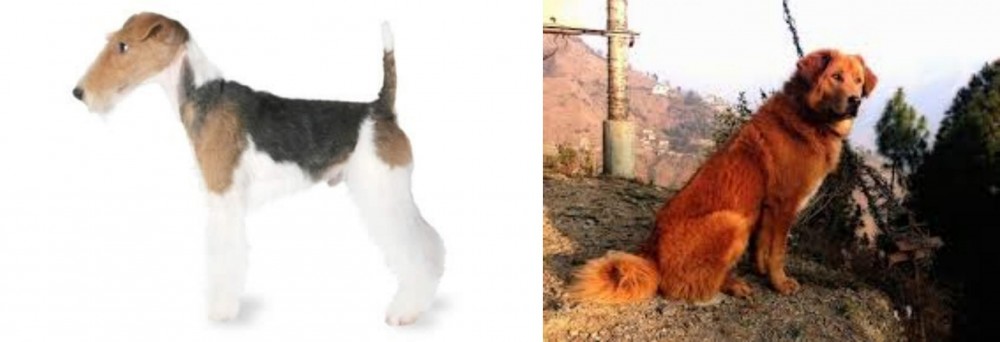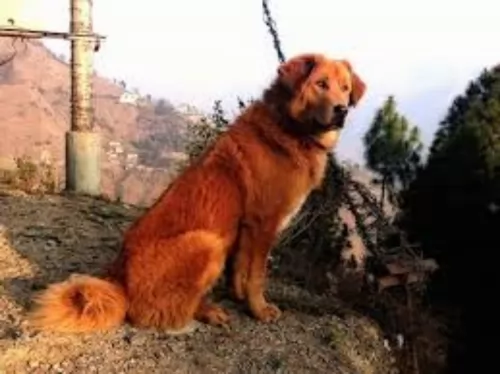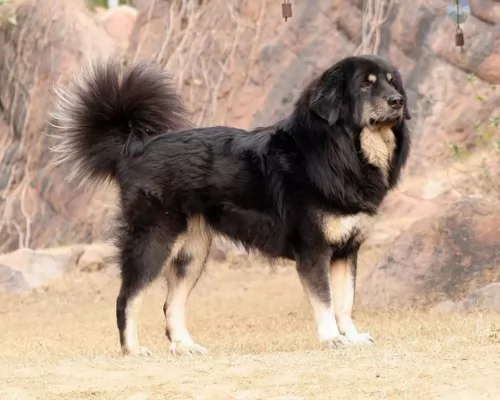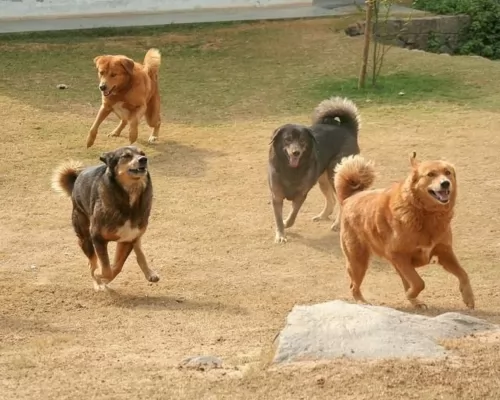 Petzlover
Petzlover Fox Terrier is originated from United Kingdom but Himalayan Sheepdog is originated from India. Fox Terrier may grow 32 cm / 12 inches shorter than Himalayan Sheepdog. Fox Terrier may weigh 36 kg / 79 pounds lesser than Himalayan Sheepdog. Both Fox Terrier and Himalayan Sheepdog has almost same life span. Fox Terrier may have less litter size than Himalayan Sheepdog. Fox Terrier requires Low Maintenance. But Himalayan Sheepdog requires High Maintenance
Fox Terrier is originated from United Kingdom but Himalayan Sheepdog is originated from India. Fox Terrier may grow 32 cm / 12 inches shorter than Himalayan Sheepdog. Fox Terrier may weigh 36 kg / 79 pounds lesser than Himalayan Sheepdog. Both Fox Terrier and Himalayan Sheepdog has almost same life span. Fox Terrier may have less litter size than Himalayan Sheepdog. Fox Terrier requires Low Maintenance. But Himalayan Sheepdog requires High Maintenance
 The Wirehaired Fox Terrier and the Smooth Fox Terrier were for over 100 years the same breed of dog. Now it is believed that they are two separate breeds with two separate ancestry. It is an English creation with Dachshunds, Fox Hound, English Hounds, and Beagle in their background. It is also believed that the Wales, Durham and Derbyshire extinct rough-coated black and tan working terrier. The white terrier breeds that exist today are related to the Fox Terrier. In addition, it is recognized that terrier breeds of today such as the Jack Russel, the Rat Terrier, and the Miniature Fox Terrier are descendants of the Fox Terrier.
The Wirehaired Fox Terrier and the Smooth Fox Terrier were for over 100 years the same breed of dog. Now it is believed that they are two separate breeds with two separate ancestry. It is an English creation with Dachshunds, Fox Hound, English Hounds, and Beagle in their background. It is also believed that the Wales, Durham and Derbyshire extinct rough-coated black and tan working terrier. The white terrier breeds that exist today are related to the Fox Terrier. In addition, it is recognized that terrier breeds of today such as the Jack Russel, the Rat Terrier, and the Miniature Fox Terrier are descendants of the Fox Terrier.
They are one of the oldest of the terrier breeds dating back to the 17tth century in the British Isles. They were primarily farm dogs guarding against the fox and vermin. Like any terrier they go to ground – digging, growling, barking and lunging at the den until the animal comes out and the farmer killed it. The breed was made popular in England through their living with royalty. The Nots Kennel had a lot to do with this as well. King Edward VII’ Wire Fox Terrier came from the Notts Kennel. The Best Champion of Crufts in 1911 was a Wire Fox Terrier, and Queen Victoria had one as well. The Wire Fox Terrier finally became a family dog in the 1930’s. During this time there were feature movies and comic strips that feature a Wire Fox Terrier, such as The Thin Man and The Adventures of Tintin.
The late 1900’s saw the population moving off the farms, out of the country and into the cities. This caused a decline in the popularity of the breed. Keeping terriers born to hunt in the city proved a challenge in the beginning. Their popularity is influenced as well by the breeds success in the prestigious Westminster Kennel Club Dog Show in New York – second only to the Crufts Dog Show in England. Adding to their early success at Crufts, the Wirehaired Fox Terrier breed has won more Westminster Best in Show than any other with 14. Only five dogs have won at Westminster more than once and one of those is a Wirehaired Fox Terrier. A Smooth Fox Terrier won it three times.
 The Himalayan Sheepdog comes from Nepal originally and was bred as a guardian for livestock. The exact location where the breed comes from is not documented well but it is thought that they come from North India and Nepal and they are rare outside of that area. They are a mountain dog – close in ancestry to the Himalayan Mastiff, and the Kinnaur Sheepdog of Tibet (Himalaya). All these Himalayan mountain dogs were all called “Gaddi dogs”. The term was used for all the large dogs no matter what their breeds actually were.
The Himalayan Sheepdog comes from Nepal originally and was bred as a guardian for livestock. The exact location where the breed comes from is not documented well but it is thought that they come from North India and Nepal and they are rare outside of that area. They are a mountain dog – close in ancestry to the Himalayan Mastiff, and the Kinnaur Sheepdog of Tibet (Himalaya). All these Himalayan mountain dogs were all called “Gaddi dogs”. The term was used for all the large dogs no matter what their breeds actually were.
The Himalayan Sheepdog is called by various names depending on where they were from. They are called Gaddi Leopardhund in Himachai Pradesh, In Nepal they are known as Bhote Kukkur or Bhotiya. Then there are Chamba Gaddi dogs. They are an ancient breed that existed before documentation on breeds was kept.
They acted as both guardians and herders. They guarded the mountain men’s encampments as well as the livestock. They were also used at times to hunt large animals. Today they are found only within Nepal and India. These Himalayan Sheepdogs are on the verge of extinction in India. There are no breeding programs and their isolation has caused the dilution of the gene pool. It is not recognized by any clubs including the UKC and the AKC.
 The Wirehaired Fox terrier is a sturdy dog with features quite similar to the Smooth Fox Terrier. It is symmetrical with a short back, round, dark eyes, a body that is shorter and ears that are v-shaped. He is medium sized with a flat skull that narrows as it approaches the nose. The nose is black, and the muzzle also tapers to it. The breed has a high, docked tail outside the United Kingdom. The tail is natural in the United Kingdom. They don’t have a broad or narrow chest, but it is deep. Laid back shoulders and a short back are signs of good breeding. Their legs are strong, and their feet have tough, cushioned pads.
The Wirehaired Fox terrier is a sturdy dog with features quite similar to the Smooth Fox Terrier. It is symmetrical with a short back, round, dark eyes, a body that is shorter and ears that are v-shaped. He is medium sized with a flat skull that narrows as it approaches the nose. The nose is black, and the muzzle also tapers to it. The breed has a high, docked tail outside the United Kingdom. The tail is natural in the United Kingdom. They don’t have a broad or narrow chest, but it is deep. Laid back shoulders and a short back are signs of good breeding. Their legs are strong, and their feet have tough, cushioned pads.
 The breed is a large dog, very athletic and strong. The Himalayan Sheepdog is muscular with a deep chest, strong neck and strong shoulders. It has a medium tail that is thick and busy, curled high over its back. It is a daunting dog that can be very intimidating. They have well padded and large paws. With a broad head and wide forehead, they have a strong, wide muzzle. Their ears are high on the head and hang from the sides. They have almond shaped medium eyes that are deep set with a black nose.
The breed is a large dog, very athletic and strong. The Himalayan Sheepdog is muscular with a deep chest, strong neck and strong shoulders. It has a medium tail that is thick and busy, curled high over its back. It is a daunting dog that can be very intimidating. They have well padded and large paws. With a broad head and wide forehead, they have a strong, wide muzzle. Their ears are high on the head and hang from the sides. They have almond shaped medium eyes that are deep set with a black nose.
They are a very active and swift dogs. By their nature they are constantly in motion, patrolling their territory and guarding their flock and people. Their devotion to their people and their courage is the stuff of legends. Their coat is double with a large ruff around their necks that resembles a mane. The inner coat is dense and short while the outer coat is longer but dense as well.
 The Wirehaired Fox Terrier is good with children but if teased and frustrated he could bite. Children should know how to play with them and not to tease them.
The Wirehaired Fox Terrier is good with children but if teased and frustrated he could bite. Children should know how to play with them and not to tease them.
He is great at performing tricks, tracking, agility, watch dog, competitive hunting or field trials.
The Wirehaired Fox Terrier is quite adaptable and can live anywhere. He is not a big dog but remember he is very high energy.
The breed is very smart but being independent thinkers, they can be difficult to train at times. Consistency and patience are needed when training the Wirehaired Fox Terrier. They get bored easily and if training sessions are not fun you will lose them. This is a breed that loves people but need constant supervision and companionship.
 Yes with enough proper socialization
Yes with enough proper socialization
Protection and loyalty
They are not especially adaptable and need a large yard. They are not good in an apartment.
Intelligent but stubborn and independent making them able to learn if they want to.
 This is basically a healthy breed, but there are some potential issues that could arise:
This is basically a healthy breed, but there are some potential issues that could arise:
This is possible in white terriers
 This is a pretty healthy breed with very few health issues. They have the usual large dog issues.
This is a pretty healthy breed with very few health issues. They have the usual large dog issues.
 Give them two meals maybe three per day. Total food per day divided into the number of meals is 1/8-1/4 cup day.
Give them two meals maybe three per day. Total food per day divided into the number of meals is 1/8-1/4 cup day.
Once again feed one-two meals per day and don’t overfeed. Total of ½ cup day
Being a terrier, the Wirehaired Fox Terrier needs a lot of exercise. He is energetic and playful. He loves to play ball, take interesting walks, and play in fenced areas. He needs to be in either a fenced area or on a leash as he will chase any small animal that he sees moving. But if you leave him unsupervised in a fenced area, don’t forget he is a terrier. He is likely to dig under or climb over a fence that isn’t entirely secure.
He loves earth dog trials, agility, tracking, hunting, flyball, and running. He hardly ever walks. He can play ball chasing for hours if you let him. Exercise is bonding for you and your Wirehaired Fox Terrier.
 Feed the puppy 2-3 times a day with a total of two cups of a quality dog food for large breed dogs.
Feed the puppy 2-3 times a day with a total of two cups of a quality dog food for large breed dogs.
Feed the adult dog twice a day with 3 to 4 cups of a high quality dry dog food for large breed dogs.
They are very strong and athletic.
The Himalayan Sheepdog needs exercise but not to be overworked. They should be taken on long walks at least once a day. They might play fetch or run in a yard, but they don’t like too much exercise.